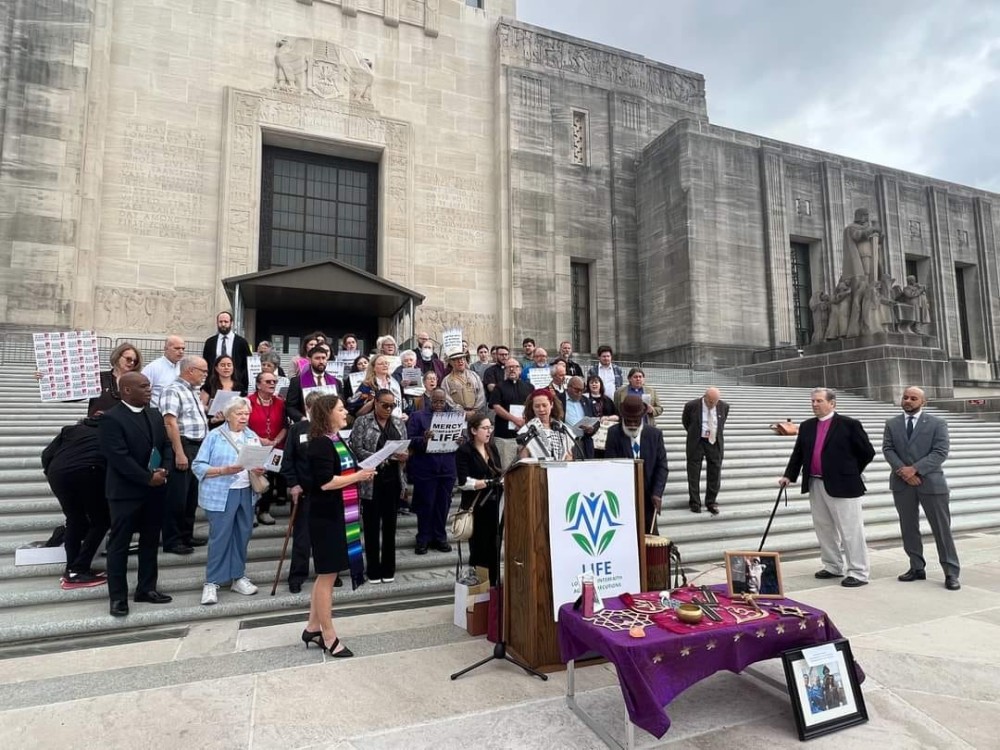Religious leaders decry plan to bring back electric chair, gassing in Louisiana

Louisiana faith leaders hold a press conference and prayer vigil on the steps of the state Capitol on February 28. (Facebook)
A cross section of religious leaders gathered on the steps of the Louisiana Capitol recently to offer prayers and protest over the state’s plan to add the electric chair and poison gas to its lineup of execution methods.
The representatives of Buddhist, Christian, and Jewish groups also objected to bills expanding the permitless carry of firearms, reducing the age of teens who can be tried as adults from 18 to 17, and reducing the amount of time that can be shaved off prison sentences for good behavior.
“The bills passed thus far have been inexcusably cruel,” said Alison McCrary, director of Louisiana Interfaith Against Executions, the group that organized the demonstration on the Capitol steps in Baton Rouge.
Louisiana Gov. Jeff Landry, who signed the bills into law March 5, praised the Republican-dominated Legislature for its get-tough-on-crime approach to making Louisiana safer.
But if more incarceration and executions provided safer communities, Louisiana already would be the safest state in the nation, McCrary countered.
“This is not a tough-on-crime or smart-on-crime approach. This is an ineffective-on-crime approach. None of these bills will fund prevention of crime, reentry programming, or rehabilitation. Instead, they will cost Louisiana $60 million to $100 million annually to incarcerate more of our community members.”
The protesters’ major objection was against House Bill 6, which allows the state to use the electric chair and nitrogen hypoxia as alternatives to lethal injection. The gas generated national and international protest in January when Alabama used it to execute Kenneth Smith, who writhed in agony for several minutes before dying by suffocation.
McCrary urged district attorneys, judges and state corrections officials to reject the harsh directives of HB6 and to promote policies that address the root causes of crime.
“We come here today to advocate for forms of justice that bring healing, for forms of justice that build up our communities, for forms of justice that shift cycles of harm,” she said. “We come here today to advocate for reconciliation and accountability that heals, to shift from punishment to repair, from control to support. We come here today to replace violence with compassion.”
Rabbi Phil Kaplan of Congregation Beth Israel in New Orleans said he joined the gathering mainly to warn against the use of nitrogen hypoxia for executions.
“I’m deeply troubled by the proposal to use gassing as a method of execution in the state of Louisiana. It is, by all accounts, unnecessarily cruel.” And its potential use is especially alarming and offensive to members of the Jewish community, he added.
“What I, as a Jewish leader, must say here is that the use of poison gas for state-sanctioned execution unmistakably and immediately evokes, for millions of American Jews, horrific memories of the depravities our ancestors suffered at the hands of Nazi Germany.”
Using nitrogen hypoxia to execute prisoners will take Louisiana “back to the time of the Dark Ages” and down “the path of moral rot from which there may be no return,” Kaplan said. “I cannot remain silent against a method of execution that so deeply offends my people and displays such blatant disrespect for our collective trauma.”
Participants also raised objections to the governor’s recent claims that death penalty opponents overlook the needs and feelings of crime victims and their loved ones.
“We pray not only for those who are on death row, but we pray for those who are victims, as well,” said Gregory Manning, pastor of Broadmoor Community Church in New Orleans. “We will not tolerate the lie that says we don’t care about victims. We do care about victims and we uphold them, too. But what we declare today is that we cannot condone the perpetuation of hate.”
Faith leaders, including those opposed to the death penalty and harsh sentencing laws, are known to bring comfort to victims and their families, said Tom Costanza, executive director of the Louisiana Conference of Catholic Bishops.
“As a church, we accompany our sisters and brothers, children and parents and loved ones when they’ve suffered from the heinous crime or violent action of others. We know healing can come from forgiveness. That has been a powerful force in the lives of many families who have experienced violence.”
And that role is in keeping with church teachings about the immorality of the death penalty, Costanza added.
“The death penalty is a pro-life issue for the Catholic Church.”
Protesters also countered the narrative that people of faith in the US generally support the death penalty.
“We declare here today that these bills do not represent all of us, that they should not represent anyone,” Equal Justice USA said in a statement read by Caroline Durham, executive director of the St. Charles Center for Faith + Action, a sister organization of St. Charles Avenue Baptist Church in New Orleans.
“We stand against these bills in Louisiana seeking to limit life in its continuance and beauty. We stand for life because it is a gift to all of us and not something we have the right or wisdom to take. Everyone has the right to live and die a natural death. The death penalty negates this. It is the opposite of community, the opposite of care, the opposite of life.” —Baptist News Global





